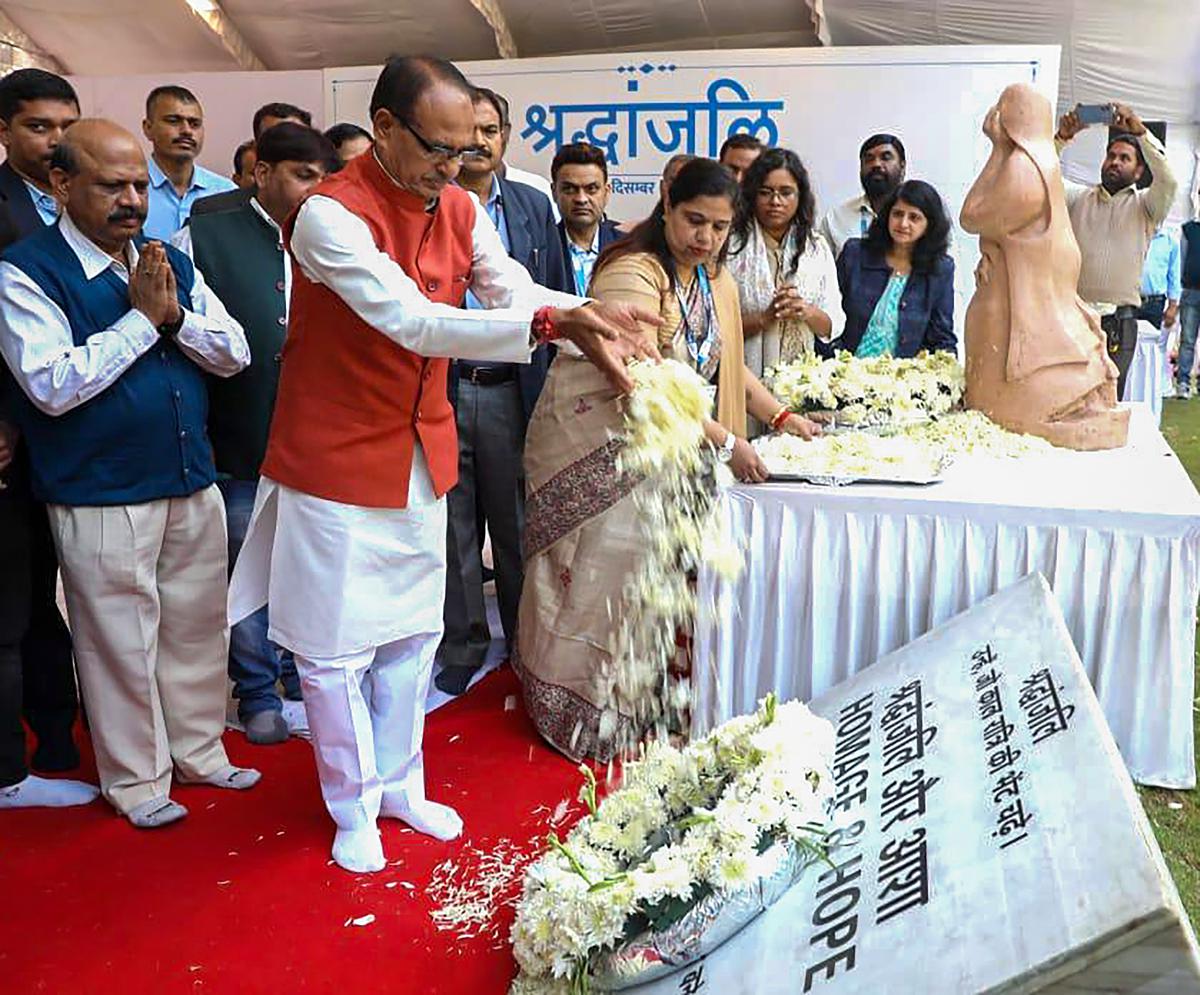To mark the 39th anniversary of the world’s worst industrial disaster, Madhya Pradesh Chief Minister Shivraj Singh Chouhan paid tribute to the victims of the Bhopal Gas Tragedy that occurred on December 2 and 3, 1984. This tragic incident unfolded in Bhopal, Madhya Pradesh, when methyl isocyanate (MIC) leaked from the Union Carbide India Limited (UCIL) factory, resulting in the loss of thousands of lives and leaving a lasting impact on survivors.
Nightmares of the Past
Recalling the horrifying scene that followed the MIC leakage, CM Shivraj Singh Chouhan expressed, “When we remember the accident on the night of 2-3 December, we get nightmares.” The Bhopal Gas Tragedy is etched in history as the world’s worst industrial disaster, claiming the lives of 5,295 people and causing injuries to almost 5,68,292 individuals on that fateful night.
Candle March and Demands for Justice
In remembrance of the tragedy, the people of Bhopal organized a candle march, with women carrying placards seeking compensation, healthcare, and justice. The march, starting from Sidhi Colony and concluding at the memorial near the factory, served as a poignant reminder of the ongoing struggles faced by survivors.
Background and Government Policies (1970s)
During the 1970s, the Indian government implemented policies to attract foreign investment in local industries. As part of this initiative, Union Carbide Corporation (UCC) was commissioned to construct a Sevin pesticide manufacturing plant in Bhopal, India, with a requirement for substantial local shareholder participation.
Plant Construction and Zoning (Location Decision)
The plant was strategically located in Bhopal due to its central position and accessible transport infrastructure. However, it was situated in an area zoned for light industrial and commercial use, not intended for hazardous industries.
Evolution of Plant Operations (1970s-1980s)
Initially approved for pesticide formulation, the plant’s operations expanded to include “backward integration” in response to industry competition. This involved the in-house production of raw materials, a more intricate and inherently hazardous process.
Challenges and Decreased Profitability (1984)
By 1984, the plant faced reduced demand for Sevin, attributed to widespread crop failures and famine. Local managers were directed to close the facility, aiming for a sale or dismantling. Safety standards, however, lagged behind those of its sister plant in West Virginia.
Critical Safety Lapses (Late 1984)
Despite plans to close or sell the plant, it continued to operate with inadequate safety measures. The vent-gas scrubber and gas flare safety system were non-functional, and safety procedures were subpar. The local government hesitated to impose strict safety regulations, fearing economic repercussions from the potential closure of a major employer.
Tragic Events of December 2-3, 1984
On the night of December 2, a methyl isocyanate (MIC) gas leak occurred due to a faulty valve and the absence of safety measures. The gas release resulted in a catastrophe, claiming the lives of thousands in Bhopal and causing widespread environmental damage. The incident remains one of the most devastating chemical disasters in history, forever associating the name Bhopal with industrial tragedy.
Ongoing Environmental Concerns
Rachna Dhingra of Bhopal Group for Information and Action highlighted the environmental hazards persisting in the aftermath of the tragedy. Companies such as Gas Authority India Limited (GAIL), ONGC, Indian Oil Corporation, and others allegedly continued business with Union Carbide while it was evading responsibility.
Survivors and activists are now urging accountability from Dow Chemical, the company that took over Union Carbide. They emphasize the urgent need to remove waste from the factory, which is contaminating underground water and affecting densely populated colonies in the vicinity.
Decades of Protest for Justice
Despite the release of a significant amount of compensation by the state government over the years, survivors of the Bhopal Gas Tragedy continue to protest for the prosecution of the main culprits. The quest for justice and accountability remains a prolonged battle for those who suffered the immediate and long-term consequences of the toxic gas leak.
Important Questions Related to Exams
Q. Why did Madhya Pradesh Chief Minister Shivraj Singh Chouhan pay tribute to the victims of the Bhopal Gas Tragedy on December 2 and 3, 1984?
Answer: Madhya Pradesh Chief Minister Shivraj Singh Chouhan paid tribute to mark the 39th anniversary of the world’s worst industrial disaster, the Bhopal Gas Tragedy.
Q. What triggered the tragic events of December 2-3, 1984, during the Bhopal Gas Tragedy?
Answer: The tragic events were triggered by a methyl isocyanate (MIC) gas leak on the night of December 2 due to a faulty valve and the absence of safety measures, leading to a catastrophic outcome
Q. Why was Union Carbide Corporation (UCC) commissioned to construct a Sevin pesticide manufacturing plant in Bhopal during the 1970s?
Answer: During the 1970s, the Indian government implemented policies to attract foreign investment. UCC was commissioned to build the plant in Bhopal as part of this initiative, with a requirement for substantial local shareholder participation.



 NTPC & Indian Army Collaborate for S...
NTPC & Indian Army Collaborate for S...
 Bihar CM Unveils Rs 7,160 Cr for Panchay...
Bihar CM Unveils Rs 7,160 Cr for Panchay...
 ADB Approves $434M Loan for 500 MW Solar...
ADB Approves $434M Loan for 500 MW Solar...

